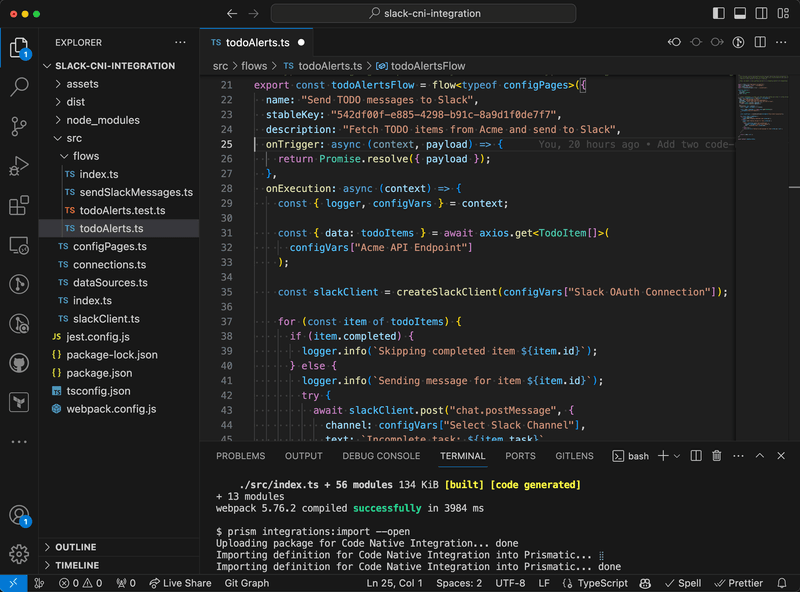Introducing Code-Native Integrations

I'm thrilled to announce a game-changing update to Prismatic: today we launched a code-native integration building experience!
As part of our mission to make integrations easier for B2B SaaS teams, we want everyone on your team to have integration tools they love and feel comfortable using.
Many Prismatic users are comfortable using our low-code integration designer and are building integrations faster than ever after its recent updates. We set out to create an equally great integration building experience for those of you who feel more comfortable and productive writing code.
Watch this quick video or read on for the details.
Build integrations completely in code
Here are the highlights:
- Build integrations completely within your IDE rather than the low-code designer.
- Triggers, connections, integration logic, and the customer-facing configuration experience are all defined in code.
- Define integration logic however you see fit rather than leveraging predefined logic steps.
- More easily incorporate integrations into your existing CI/CD process and code repositories.

Code-native integrations leverage the same core platform as those built with the low-code designer. Once you've built a code-native integration, you can deploy it to customers, embed it in your app, and run it in production using all the same Prismatic functionality you currently use for your low-code integrations.
Tips for when to use low-code vs code-native integrations
Our team is always happy to help with recommendations on when you might want to use low-code versus code-native integrations. Here are some tips to get you started:
- If your #1 priority is to save dev time, you'll most likely want to have non-devs build integrations in the low-code designer. You can always involve developers to write custom components or create a code block for a bit of complex logic.
- If you don't have non-devs who can take on building integrations, or simply prefer to have devs build them, the method is a matter of preference. Many devs will feel more comfortable and productive building code-native integrations.
- Some teams have non-devs in their sales or success teams use low-code to quickly build proof-of-concept integrations, and later hand them over to devs to build in code if they become especially complex.
Of course, your priorities, teams, and resources might change over time, and Prismatic will flex right alongside you. You can always switch from one method to the other!
Versatility is critical in B2B SaaS integration solutions
Today's launch of code-native integrations is part of our deep commitment to providing the most versatile and dev-friendly embedded iPaaS on the market.
At Prismatic, we believe that any integration solution for B2B SaaS needs to be extremely versatile to keep up with the huge variety of integrations you build, all the teams involved in delivering them, and the ways your integration strategy might evolve over time.
That's why we've always provided a comprehensive platform that supports you throughout the build-deploy-support integration lifecycle and provides you with variety of tools and options for every phase.
Thank you and next steps
Thank you to those of you who have helped with ideas, feedback, and everything else that's contributed to today's launch of code-native integrations. We'll continue to evolve the platform and ensure that our integration is second to none in versatility and dev-friendliness.
Be sure to register for our upcoming webinar to see code-native integrations in action, or start a free trial to check them out for yourself.
About Prismatic
Prismatic, the world's most versatile embedded iPaaS, helps B2B SaaS teams launch powerful product integrations up to 8x faster. The industry-leading platform provides a comprehensive toolset so teams can build integrations fast, deploy and support them at scale, and embed them in their products so customers can self-serve. It encompasses both low-code and code-native building experiences, pre-built app connectors, deployment and support tooling, and an embedded integration marketplace. From startups to Fortune 100, B2B SaaS companies across a wide range of verticals and many countries rely on Prismatic to power their integrations.
Get the latest from Prismatic
Subscribe to receive updates, product news, blog posts, and more.

